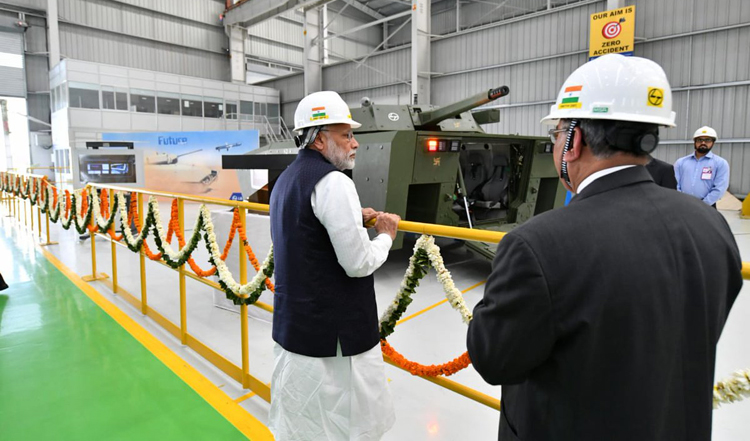INDIAN ARMED FORCES CHIEFS ON OUR RELENTLESS AND FOCUSED PUBLISHING EFFORTS

The insightful articles, inspiring narrations and analytical perspectives presented by the Editorial Team, establish an alluring connect with the reader. My compliments and best wishes to SP Guide Publications.

"Over the past 60 years, the growth of SP Guide Publications has mirrored the rising stature of Indian Navy. Its well-researched and informative magazines on Defence and Aerospace sector have served to shape an educated opinion of our military personnel, policy makers and the public alike. I wish SP's Publication team continued success, fair winds and following seas in all future endeavour!"

Since, its inception in 1964, SP Guide Publications has consistently demonstrated commitment to high-quality journalism in the aerospace and defence sectors, earning a well-deserved reputation as Asia's largest media house in this domain. I wish SP Guide Publications continued success in its pursuit of excellence.
- Indian Armed Forces gets the first Woman Director General of Medical Service (Army)
- General Upendra Dwivedi takes over as the Chief of the Army Staff
- Rajnath Singh assumes charge as Defence Minister for the second consecutive term
- Prime Minister witnesses 'Bharat Shakti' – a Tri-Services Firing and Manoeuvre Exercise in Pokhran, Rajasthan
- Interim Defence Budget 2024-25 — An Analysis
- Union Defence budget 2024
Biggest Make in India programme for Indian Army dropped
MoD to take de novo look at $8.5 B combat vehicle procurement under different category

The biggest Make in India programme for the Indian Army to produce 2,600 Futuristic Infantry Combat Vehicles (FICVs) at an estimated cost of 60,000 Crore ($8.5 B) under the Make-1 procedure has been dropped.
"Development Agencies could not be shortlisted as the financial and technical criteria were found to be subjective in the selection process," Minister of State for Defence Shripad Naik stated in a written reply to a question in the Lok Sabha on December 11.
The mega procurement case, which is in the works since 2009 to replace the Soviet vintage BMP-IIs, has been pushed back to the Ministry of Defence for a de novo look for re-initiation under a different procurement category, SP's Land Forces has learnt from official sources.
"Development Agencies could not be shortlisted as the financial and technical criteria were found to be subjective in the selection process," Minister of State for Defence Shripad Naik stated in a written reply to a question in the Lok Sabha on December 11
While "subjective criteria" is the official version cited for the derailment, sources have revealed that it was an attempt by a competing company to alter the terms of the competition which tripped the programme.
The FICV procurement was approved by the Ministry of Defence in 2015 under the Make-1 category, under which the Ministry was to have funded 80 per cent of the development of prototypes by the Ordnance Factory Board (OFB) and two other private companies shortlisted as Development Agencies through a selection process. The development cost to the Government was estimated to be about 3,000 Crore.

While the OFB would be assured of an order, the other two Development Agencies were required to compete for a tender after the development of prototypes.
The companies in the fray were Larsen & Toubro, Pipavav (later Reliance), Titagarh Wagons, Tata Motors, Bharat Forge, Tata Power SED and Mahindra. Tata Motors and Bharat Forge teamed up for a consortium bid.
"One of the companies in contention made an unsolicited offer to develop the prototype on its own cost. Following this, two other contenders too offered to do the same. These three companies sought a migration of the competition to the Make-2 category - in which no funding is required from the Government for the development of a prototype - with an invitation to the same set of companies to compete," an official disclosed.
While "subjective criteria" is the official version cited for the derailment, sources have revealed that it was an attempt by a competing company to alter the terms of the competition which tripped the programme
Those running the programme felt a proposal which involved the saving of 3,000 Crore to the Goverment could not be overlooked, and send the case back to the Ministry of Defence for reconsideration.
But the Ministry refused to "migrate" an ongoing programme to a different procurement process, nor restrict itself to the same set of bidders, and has instead decided to consider the FICV programme de novo, holding that the older process was no longer valid.
This effectively means that the procurement has been pushed back to Square 1, where the case would have to be moved afresh under a different category, and perhaps with revised Army Staff Quality Requirements (ASQRs).
The ASQRs drafted in 2015 while initiating the Make-1 programme sought a compact, tracked and amphibious FICV, not heavier than 18-to-20 tons to enable transport into combat zones. It also specified a requirement of firing anti-tank guided missile at a range of 4 km, and space for a crew of three and eight combat-kitted infantry soldiers.





